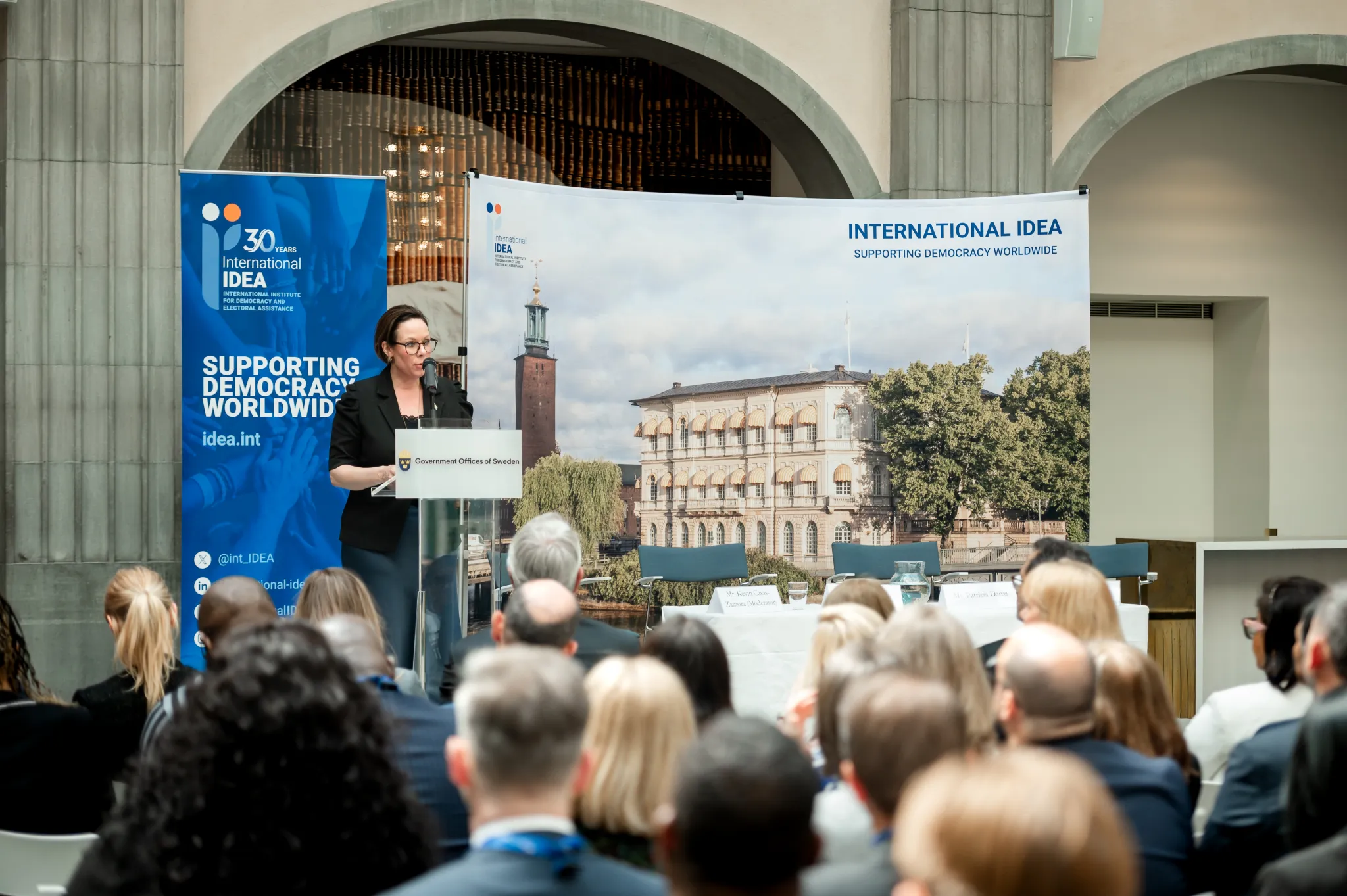Introductory remarks by Ms. Maria Malmer Stenergard, Minister for Foreign Affairs, at International IDEA’s 30th Anniversary

Introductory remarks by Ms. Maria Malmer Stenergard, Minister for Foreign Affairs,
at International IDEA’s 30th Anniversary, Bankhallen, Stockholm, 12 June 2025
Excellencies, Ladies and Gentlemen,
It is my great pleasure to welcome you to Stockholm and to this event, highlighting and celebrating the 30th anniversary of International IDEA.
Sweden has been a proud host country of International IDEA, and its largest donor of core support since IDEA’s foundation. We are grateful for the partnership we have with the Institute, and for the important work IDEA does for democracy around the world.
In the mid-1990s, when IDEA was founded, there was a surge of new democracies around the globe. At that time, there was a widespread will and ambition to create a new, free and democratic world. Ever since, IDEA has played an important role to support and promote that ambition.
In the past two decades, we have seen a global democratic decline and the rise of authoritarian leadership. According to the research institute Varieties of Democracy at Gothenburg University, more than 70 % of the world’s population now live in autocracies.
But these numbers must not make us despair. Rather, they should be taken as a call for action, as we need to be more vigilant than ever in our cause to promote, protect and defend democracy.
We must remember not to neglect our own democracies. In Sweden, we address democratic challenges daily and continuously review laws and policies to strengthen our institutions, ensuring they are fit for the modern world. For example, work is currently ongoing to review our laws on political party financing, as well as strengthening our elections law.
And beyond our borders our commitment to democracy remains firm. Support to democracy, human rights and the rule of law amounts to around 25 % of all Swedish development assistance. And as Foreign Minister, defending democratic principles and values is part of my daily work.
In light of recent developments in the world, we underline the importance for the EU to continue to defend and promote democracy. European countries continue to face up to the many democratic challenges, not least foreign information manipulation and interference. In this context, we welcome the work done within the so-called EU Democracy Shield, which has as its ambition to protect democracy within the EU.
To summarise: Democracy is not something that you have – it’s something that you do, every day.
Democracy is really a summary of many different verbs: Vote. Include. Protect. Respect. Listen. Engage. Innovate.
Let me list three ways how we can further promote and defend our democracies.
First, we need to demonstrate that democracy delivers for people.
We know that democratic societies deliver better services and stronger economies than autocracies. It’s also important to point out that democracy is not a western concept, and that democracy can take many different shapes and forms. Recent research showed that a majority of people in Africa say that democracy is their preferred system of government. In a world of information overload, we must be better at articulating and communicating the positive benefits of democracy. International IDEA provides a platform for us to discuss how to do that more
effectively.
Second, the link between democracy and peace needs to be made clearer.
Russia’s full-scale aggression against Ukraine has again put the spotlight on the interconnectedness of security, democratic values and institutions. Ukraine’s unwavering courage and resistance inspire us to stand up for our joint values and principles. Sweden will continue our steadfast support to Ukraine’s fight for freedom, independence and democracy.
Research shows us that a more democratic world is a more peaceful world. Investing in democracy, at home and abroad, is therefore very much in our own self-interest.
Third, we need to provide democracy support where it’s needed.
In a time of budget cuts and reallocation of development aid, supporting actors and institutions that enable stronger democracies remain key. This includes supporting some of the fundamental pillars of democracy, including free and fair elections, as discussed earlier this week. Further, empowering independent democratic institutions such as the judicial system. A free and independent media climate. A vibrant and pluralistic civil society. Protecting human rights and fundamental freedoms. These are some of the areas where democracy support can go a long way.
Excellencies, ladies and gentlemen...
Recent developments have shown that we cannot take our freedom and democracy for granted. The threat to democracy is present in all our countries, and we cannot close our eyes to the various attempts to destabilize trust in our chosen form of governance. We need to fight for it every day, because freedom is not free.
I hope that all of us in this room, who share the common belief in the value of democracy for the world and its people, will do what it takes. Thank you.
It is now my honour to give the floor to our distinguished keynote speaker, Her Excellency Ms. Michelle Bachelet. Michelle was the first female President of Chile, and her career has also included serving as the United Nations High Commissioner for Human Rights and as the Executive Director of UN Women. We are very happy to have you here in Stockholm, and we look forward to hearing your insights!